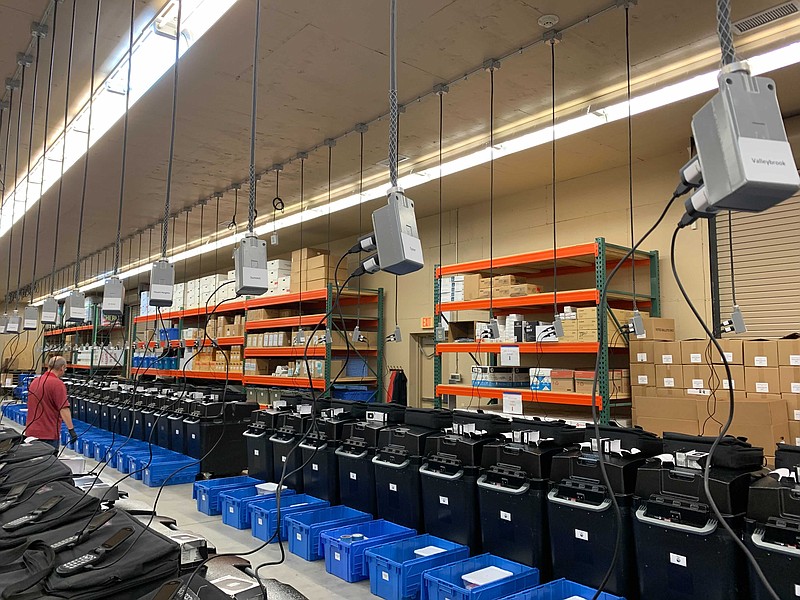Neither term limits nor closed primaries will be in Tennessee's near future.
The Tennessee House killed bills that would have paved the way for both in committee votes earlier this week. The term limits bill fell 6-1 in the Elections and Campaign Finance Subcommittee, and the closed primaries bill was defeated in a voice vote by the Local Government Committee.
We think the committee members made the right choice in both cases, but we salute freshman state Rep. Bryan Richey, R-Maryville, for sponsoring both because there is a measure of support among state Republicans in general for term limits and for closed primaries that would allow Tennesseans to vote only in the primary of the party with which they are registered.
The term limits bill would have helped create a referendum process that would have allowed the public to vote on whether their elected and appointed officials would be term limited. If a local electorate had voted in the affirmative, it would have prevented members of local city councils or county commissions from serving more than 16 years (unless already in a term that took them past 16 years).
Richey told this page last week the original bill would have included all county and municipal offices, but what was eventually turned down was a much more limited proposal.
He also told us term limits in general polls in the affirmative for some 70% of Tennesseans.
However, such polling may be more general in nature, with poll respondents perhaps thinking not necessarily of their local county commissioner or city council member but members of Congress. But, according to the United States Supreme Court, it is unconstitutional for states to put a limit on the terms of House and Senate members.
We would have loved for the full Tennessee House to have had a broader discussion on term limits, but the subcommittee did what Richey was afraid it would do last week by killing it there. Among the subcommittee members voting against the bill was state Rep. Esther Helton-Haynes, R-East Ridge.
Nevertheless, term limits are perfectly acceptable on a local level -- Memphis has them -- so we'd prefer any decision on determining how long members of local governments can serve to be made at the local level.
Richey's closed primaries bill failed in a voice vote, according to Rep. John Crawford, R-Bristol/Kingsport, the committee chairman, but Richey said his personal count was 9-8 in favor of the measure. The defeat, he said, taught him a lesson to call for a roll call vote for future bills important to him.
Among those recorded as voting for the bill was state Rep. Greg Martin, R-Hixson. In a message to this page, he cited its aspects of voters not having to register until 30 days before a primary or being allowed to change a registration until 30 days before a primary.
"Thirty days gives citizens enough time to switch party affiliation if they so desire," he wrote. "It's about timing, not exclusion, from my point of view."
The state GOP Executive Committee voted as recently as 2018 on a resolution to recommend closed primaries to the state legislature, and the Tennessee Conservative news site in a 2022 survey said 97.11% of respondents voted that the governor, House speaker and lieutenant governor should work to pass legislation that would close GOP primaries to prevent Democrat crossover voting.
A slightly different bill that will be heard on March 1 in the House Elections and Campaign Finance Subcommittee (on which Helton-Haynes sits) would require voters to register with a particular party or register that they are unaffiliated with a party. They could do so at the first available primary election after July 1, 2023, or at the county's election commission. If a voter does not make a designation either in registering to vote for the first time or by July 1, 2024, the voter would be registered as unaffiliated.
It would then authorize political parties to allow unaffiliated voters to vote in their particular primary. Ostensibly, then, both parties could allow unaffiliated voters to vote in their primary, only one or the other could, or neither could.
The bill is sponsored by state Rep. Kelly Keisling, whose office said he could not be reached for comment on Friday, and Sen. Joe Hensley, D-Hohenwald.
We will be interested in hearing the discussion on this bill because it would require party registration (or unaffiliation) but not necessarily closed primaries (though they could be).
Unfortunately, if even one party closed its primaries to unaffiliated voters, it would still disenfranchise them, and that -- unless we've missed something -- doesn't meet our idea of fairness.
